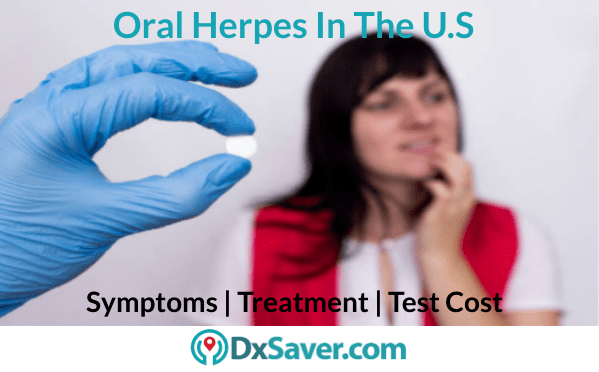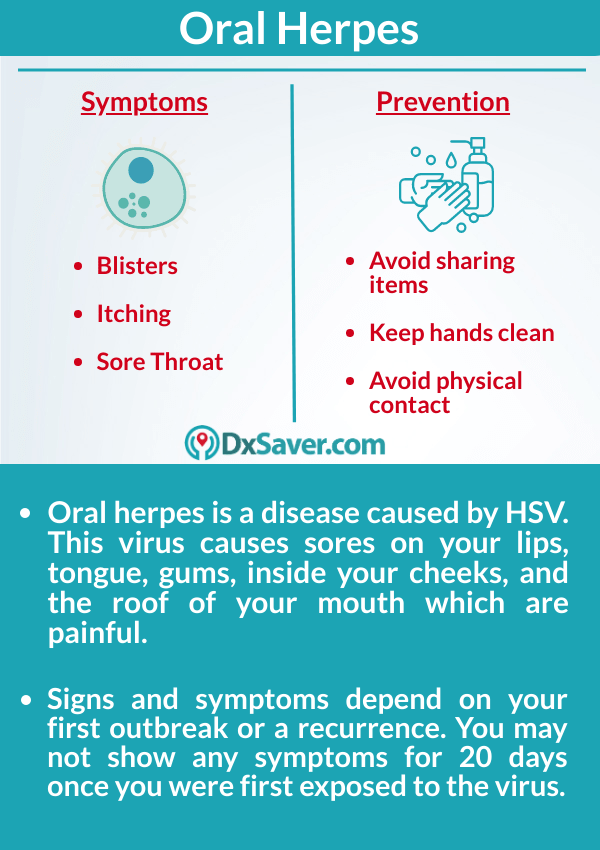
Herpes is caused by herpes simplex virus (HSV), one of the common diseases in the United States. It mainly causes sores and blisters in or around the mouth or genitals. According to the World Health Organization (WHO), around 67% of people are affected by HSV-1, and 11% have HSV-2 infection.
There are two types of HSV:
- HSV-1 causes oral herpes, which affects the mouth and surrounding skin.
- HSV-2 causes genital herpes, which affects the genitals and the groin area.
The article below covers all the important topics that are related to oral herpes, like is Symptoms of oral herpes, causes, how common is oral herpes, treatments, how to get tested, and prevention.
- What is oral herpes?
- Symptoms of oral herpes
- Causes of oral herpes
- How is oral herpes transmitted?
- Complications of oral herpes
- What are the treatments for oral herpes?
- The risk factor of oral herpes
- Prevention
- How to get tested?
- Providers Locations
What is oral herpes?
Oral herpes is a disease caused by HSV. This virus causes sores on your lips, tongue, gums, inside your cheeks, and the roof of your mouth which are painful. It also shows symptoms like fever and muscle aches. Mouth sores are most commonly affected in children aged 1-2 years, but it may also affect people of any age, at any time of the year. Oral herpes is transmitted by contracting saliva, mucous membranes, or skin of an infected person.
As this virus is highly contagious, many individuals have been infected by 1 herpes subtype before their adulthood. Once the herpes virus infects you, there’s a unique ability that you may be diagnosed with an advanced stage that is 3rd stage. In some cases, HSV is asymptomatic as it may not cause any sores and symptoms. Asymptomatic infection occurs often as a disease with active symptoms.
Symptoms of oral herpes
Signs and symptoms depend on your first outbreak or a recurrence. You may not show any symptoms for 20 days once you were first exposed to the virus. The sores will appear for many days, and the blisters will take many weeks to heal completely. Recurrences generally appear at the same spot back to back and are less severe than the first outbreak. Oral herpes passes through several stages and shows symptoms such as:
- Tingling and itching- Itching, burning and tingling around the lips before a small painful spot appears and blisters erupt.
- Blisters- Small fluid-filled blisters start erupting around your lips and they may also appear around the nose, cheeks, and inside the mouth.
- Oozing and crusting- The small blisters may merge and burst, which leaves open sores that ooze and crust over.
You may experience these symptoms in the first time outbreak:
- Fever
- Painful gums
- Sore throat
- Headache
- Muscle aches
- Swollen lymph nodes
Children under 5 years old may have cold sores inside their mouths and the lesions are commonly mistaken for other infections like canker sores which involve only the mucous membrane and aren’t caused by HSV.
Causes of oral herpes
Oral herpes is caused by HSV-1 and genital herpes is caused by HSV-2. Both infections can spread to the face and genitals through close contact, like kissing, or oral sex. HSV-1 is also spread through shared eating utensils, razors, and towels.
HSV-1 is a most contagious infection as oozing blisters appear because it easily spreads through contact with body fluids. The virus can spread even without blisters. Many individuals who are infected with oral herpes do not show any signs or symptoms.
Once you are infected with the herpes infection, the virus is present in the nerve cells in your skin and will emerge as another oral herpes at the same place where it was affected before. Recurrence may occur due to:
- Viral infection
- Fever
- Hormonal changes
- Stress
- Fatigue
- Exposure to wind or sunlight
- Changes in the immune system
- Injury to the skin
How is oral herpes transmitted?
Oral herpes is transmitted by oral contact via the HSV-1 virus in sores, saliva, and surfaces in and around the mouth. Oral herpes can be transmitted to the genital area through oral-genital contact and may cause genital herpes. Sex is not the main reason for the transmission of the herpes virus as herpes can also be passed in non-sexual ways, like if a parent having oral herpes gives a peck on the lips. Most people are affected by oral herpes when they were kids. In rare cases, the mother may pass herpes to a baby during vaginal childbirth.

Complications of oral herpes
Complications of oral herpes include:
- Fingertips- Both herpes can be spread to the fingers. This type of infection is also known as herpes whitlow. Children may transfer the infection from their mouths to their thumbs who suck their thumbs.
- Eyes- It can cause an eye infection. Reoccurrence of injection can cause scarring and injury, which may lead to vision problems like loss of vision.
- Widespread areas of skin- Those who have skin problems like atopic dermatitis are at a higher risk of spreading oral herpes all over their body. This can also lead to serious medical emergencies.
What are the treatments for oral herpes?
Treatment of oral herpes includes medication and taking plenty of fluids:
- An antibiotic such as viscous lidocaine is prescribed to relieve pain.
- Oral and IV medication is not recommended for those with a normal immune system. It is used only for those who have a weakened immune system, infants younger than 6 weeks, and people having severe disease.
- Some people are required to take treatment in the hospital, those who have:
- Severe local infection
- Infection that has spread to other organs
- Weak immune systems
- Dehydrated body
- Infants younger than 6 weeks
The risk factor of oral herpes:
The studies say that most individuals are at risk of oral herpes in the United States. Many carry the virus that causes oral herpes, even if they do not show any symptoms.
You’re at risk of this virus if you have a weakened immune system from conditions and treatments such as:
- HIV/AIDS
- Atopic dermatitis (eczema)
- Cancer chemotherapy
- Anti-rejection drugs for organ transplants
Prevention
Your physician may prescribe an antiviral medication if you develop oral herpes more than nine times a year or if you are at high risk of complications. If sunlight triggers your recurrences, don’t avoid to sunblock where the cold sore where it erupts. Consult your physician about using an oral antiviral drug.
To avoid spreading oral herpes to other people or to other parts of your organ, follow the below-mentioned precautions:
- Avoid physical contact while blisters occur- When the blisters leak fluid, the virus transmits more quickly.
- Avoid sharing items- The virus may also spread through a sharing of utensils, towels, lip balm, and other items when blisters are present.
- Keep your hands clean- If you are infected with a cold sore, wash your hands regularly before touching yourself or other people, mainly infants.
How to get tested?
Your physician will test herpes based on your physical exam and the results of certain laboratory tests. We have shortlisted the top 3 laboratories network that provides herpes STD testing at an affordable cost and does confidential testing.
Herpes test cost ranges between $35 and $119 in different labs and facilities across the U.S.
No prior appointment is required. Compare the price, order your test online, and visit the nearest lab during lab business hours. Complete the procedure and get the results in your email in 2 to 3 business days. Doctor consultation is also available for further treatment or any kind of medical advice.
The following table shows the Herpes test cost at 3 of our partner laboratories (CLIA – Certified) network located across the U.S.A.
Name of our Partner Labs | Book Online |
STD Check Labs
| Starting from
$35 |
LetsGetChecked(Home Test Kit)
| Starting from
$89.25 |
HealthLabs
| Starting from$45 |
Providers locations
Herpes STD testing can be done in any of the following locations across the U.S. either by visiting the lab or by shopping for the herpes STD home test kit.
- Arizona
- Arkansas
- California
- Colorado
- Connecticut
- Delaware
- Florida
- Hawaii
- Georgia
- Idaho
- Illinois
- Indiana
- Iowa
- Kansas
- Kentucky
- Louisiana
- Maine
- Michigan
- Minnesota
- Mississippi
- Missouri
- Montana
- Nebraska
- Nevada
- New Hampshire
- New Mexico
- North Carolina
- North Dakota
- Oklahoma
- Oregon
- Pennsylvania
- Puerto Rico
- South Carolina
- South Dakota
- Tennessee
- Texas
- Utah
- Vermont
- Virginia
- Washington
- West Virginia
- Wisconsin
- Wyoming
Other topics you may be interested in:-
- How Much Does At-Home COVID-19 Home Test Kit Cost in the U.S?
- Symptoms of Herpes Infection in Men
- Genital Herpes Symptoms in Women
- Types of STD that causes dry skin
- Signs and Symptoms of Oral Syphilis
- Eye Chlamydia Symptoms
- Anti-aging Testing Cost in the U.S.
- At-Home Chlamydia Testing Cost in the U.S.
- Celiac Disease Test Cost in the U.S.
- Types of STDs That Cause Mouth Sores Symptoms in Men and Women
- Herpes Vs. HPV: Differences, Symptoms, and Testing Cost
- Parkinson’s Disease Symptoms, Stages, Diagnosis & Treatment
- What are the symptoms and how to prevent STDs?
- Oral STDs: Names, Symptoms, Treatment and Testing Cost
- HPV in Women: Symptoms, Genital Warts, Treatment and More
- What are the risks of having Gonorrhea? Symptoms, Treatment, & cost
- How much does the Chlamydia test cost? Symptoms and Prevention
- How much does the Allergy test cost? Symptoms, Types, Treatment, and Prevention





